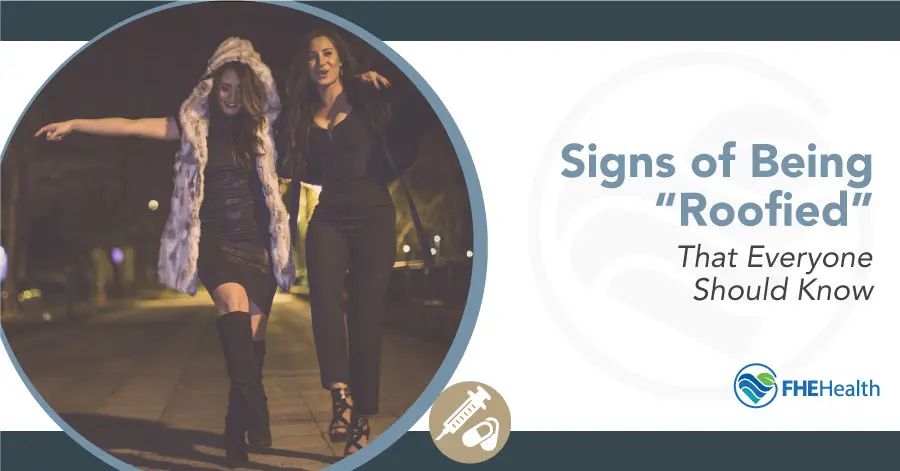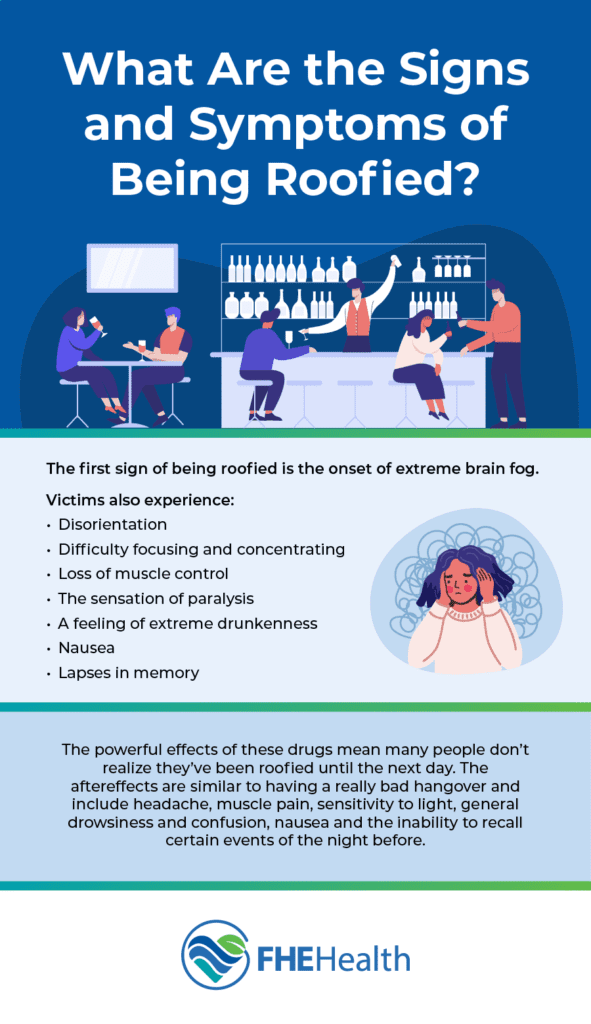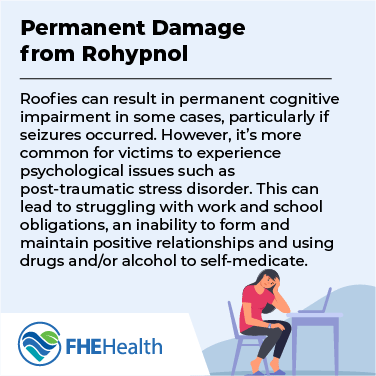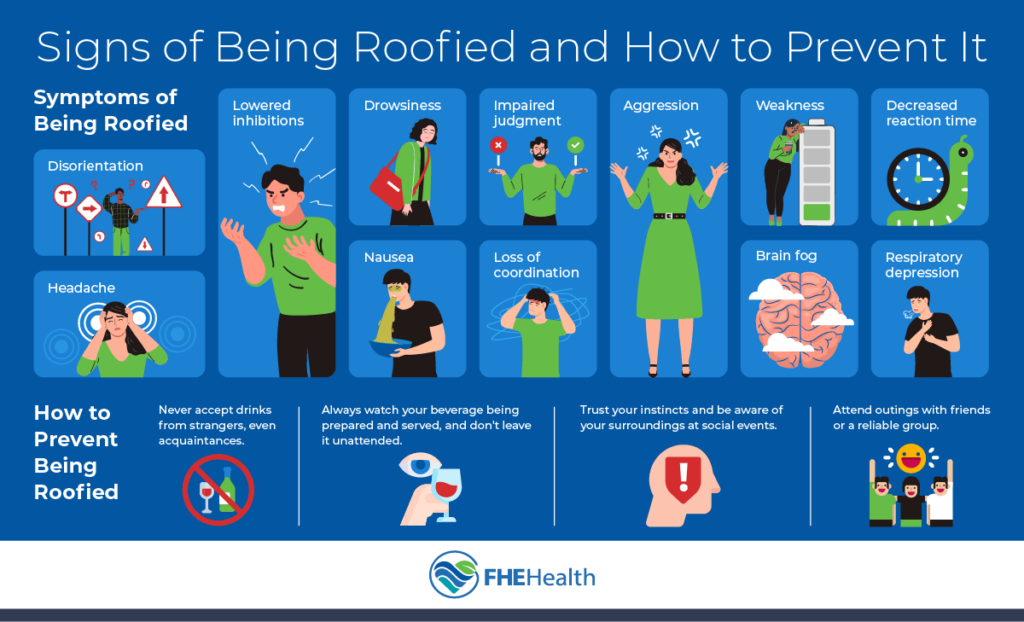
The act of being drugged without your knowledge or consent is commonly called “being roofied.” The term “roofie” originated as a way to describe the drug Rohypnol and its role in date rapes. Since then, the concept of roofieing has come to refer to several drugs used for this same purpose.
In the sections that follow, you’ll find important safety information that will help you better protect yourself from the dangers of being roofied. We’ll cover the signs of being roofied, its prevalence, what to do if you suspect you’ve been a victim, and other roofie prevention tips and considerations.
What Is a Roofie?
A roofie is a central nervous system depressant that, much like the prescription medicine Valium (diazepam), slows down the brain and relaxes the body. The important difference is that a roofie is much stronger than Valium. One small tablet of Rohypnol can cause a person to pass out and forget what happened to them while under the influence.
This amnesia (memory loss) is more likely to occur when a roofie is mixed with alcohol. Roofies are easy to slip into a drink. They’re tasteless, odorless, and, once crushed, dissolve quickly.
Common Drugs Used as Roofies
Common drugs used for roofies include:
- Rohypnol: Rohypnol is a benzodiazepine that’s approximately 10 times as potent as Xanax. Although not approved for use in the United States, this drug is nonetheless widely available on the black market. Symptoms begin within 30 minutes and last for several hours. Rohypnol may lead to death when mixed with alcohol or other depressant drugs.
- GHB: Also referred to as cherry meth, GHB is a prescription medication for the condition known as narcolepsy. Effects are felt within 15 to 30 minutes of ingestion and last up to six hours.
- Ketamine: Ketamine is a fast-acting veterinary anesthetic known as cat valium. Its effects last from 30 minutes to an hour.
Brief History of Roofies and Their Use
Rohypnol belongs to a class of drugs known as benzodiazepines, which Swiss researchers began to develop in the 1950s. Rohypnol appeared later, in 1975, as part of an effort to find safer alternatives to barbiturates. Rohypnol was never legalized in the United States, though, unlike many other benzo medications. (The drug is legal in some other countries.)
Illicit use of Rohypnol in the U.S. started in the 1990s. Reports linking the drug to date rape began around the same time.
How Roofies Are Administered
Roofies are made in pill or tablet form. They can be swallowed, crushed, snorted, or dissolved in liquid.
Tactics Used to Conceal Roofie Administration
Today, there are blue-colored tablets formulated to be visible in a drink, as well as the colorless Rohypnol tablets. Perpetrators will use the colorless tablets to conceal their aims. They may also crush and dissolve the pills or tablets in a strong-flavored alcoholic drink.
How Common Is Being Roofied?
Research gleaned from three large universities suggests that as many as one in 13 college students has been slipped drugs without their knowledge or consent. Seventy-nine percent of those who reported being drugged were women, and women were more likely to experience sexual assault after being drugged. Although it does seem to be more prevalent among the college crowd than among the population as a whole, middle and high school students, as well as older adults, have all reported being roofied.
Although commonly associated with party environments in which many people are consuming alcohol and drugs recreationally in the same general area, being roofied can also happen elsewhere, such as when you’re on a traditional date.
What Are The Symptoms and Signs of Being Roofied?
 The signs and symptoms of being roofied closely mimic those of simply having consumed too much alcohol, particularly if consumed in combination with cannabis products. This means it can be difficult to discern the difference, in some cases, between someone who’s been slipped drugs and someone who’s overindulged. Feelings of euphoria are also common in the initial stages, particularly among those who are also consuming alcohol.
The signs and symptoms of being roofied closely mimic those of simply having consumed too much alcohol, particularly if consumed in combination with cannabis products. This means it can be difficult to discern the difference, in some cases, between someone who’s been slipped drugs and someone who’s overindulged. Feelings of euphoria are also common in the initial stages, particularly among those who are also consuming alcohol.
Physical and Cognitive Effects
The first sign of being roofied is the onset of extreme brain fog. Victims also experience disorientation, difficulty focusing and concentrating, loss of muscle control, the sensation of paralysis and a feeling of extreme drunkenness. Some people may feel nauseated, and nearly everyone who’s given these drugs experiences lapses in memory.
Because of the powerful effects of these drugs, many people don’t realize they’ve been roofied until the next day. The aftereffects are similar to having a really bad hangover and include headache, muscle pain, sensitivity to light, general drowsiness and confusion, nausea and the inability to recall certain events of the night before. It’s not uncommon for those who’ve been slipped drugs to never really know what actually happened to them.
Emotional and Psychological Effects
Someone who has been roofied will feel extremely intoxicated very quickly. They may suddenly feel more amorous and sexual and respond emotionally to others in ways that are not characteristic of them. They may have feelings of paranoia.
PTSD and Other Long-Term Effects of Being Roofied
Unfortunately, these drugs can result in permanent cognitive impairment in some cases, particularly if seizures occur. However, it’s more common for victims to experience psychological issues such as post-traumatic stress disorder. This can lead to struggling with work and school obligations, an inability to form and maintain positive relationships and using drugs and/or alcohol to self-medicate.
Unfortunately, these drugs can result in permanent cognitive impairment in some cases, particularly if seizures occur. However, it’s more common for victims to experience psychological issues, such as post-traumatic stress disorder. This can lead to struggling with work and school obligations, an inability to form and maintain positive relationships and using drugs and/or alcohol to self-medicate.
What to Do if You Suspect Being Roofied
 If you are experiencing symptoms of being roofied and suspect someone has slipped you an illicit drug, call 911 immediately. Don’t drive, and don’t leave the area you’re at unless you’re in danger. Try to stay around as many people as possible until help arrives, and drink as much water as you can to help flush the drug from your system.
If you are experiencing symptoms of being roofied and suspect someone has slipped you an illicit drug, call 911 immediately. Don’t drive, and don’t leave the area you’re at unless you’re in danger. Try to stay around as many people as possible until help arrives, and drink as much water as you can to help flush the drug from your system.
If possible, tell a trusted friend about the situation. Because you may lose consciousness very quickly in this situation, acting fast is essential at the onset of any signs you’ve been roofied. It’s also important to seek medical care afterward if you wake up the next day suspecting you’ve been roofied.
If you’re not sure whether you were sexually assaulted, a medical examination can help determine if that occurred. Taking pregnancy prevention medication is usually advised in this scenario, and hospital staff can use a rape kit that can help prove the guilt of the person who assaulted you. Don’t shower or bathe until prior to going to the hospital, as it could destroy evidence.
 How Do You Prevent Being Roofied?
How Do You Prevent Being Roofied?
Strategies for minimizing the chances of being roofied include always going out with a trusted friend or group of friends to events involving alcohol consumption, not accepting drinks from others, and keeping your hand over your drink if you need to look away for a moment. Create a buddy system to prevent one person from getting separated from the group and, if necessary, take your drink to the bathroom with you.
Although there are tests and gadgets designed to let you test your drink for the presence of date rape drugs, these are still in the experimental stage and should never take the place of common sense caution.
How Long Does It Take for the Effects of Roofies to Kick in and Last?
If you’ve been roofied, it’s critical that you get help and support as soon as possible. Blood tests can identify these drugs, but the window for testing is usually short—several hours.
Once intoxication sets in—roughly 15-30 minutes after ingestion—a person will pass out and remain unconscious for at least a few hours. In the worst cases, coma and death can occur.
GHB can be detected for only 8-10 hours after ingestion. Detection of Rohypnol is possible up to 60 hours after the drug is ingested. Report the incident to authorities as soon as possible.
What to Do After Being Roofied
In addition to contacting law enforcement, here are some other suggestions for what to do after being roofied:
- Seek immediate medical treatment and inform your healthcare provider.
- Tell a close friend or family member you can trust.
- Find a therapist or join a support group.
If you’re wondering about local support groups and other resources in your area, a good place to start may be the National Sexual Assault Hotline at 1-800-656-4673.
How Can You Help If You Suspect Someone Has Been Roofied?
If you suspect someone’s been roofied, the first thing you should do is have them drink as much water as possible. Make sure they’re safe from any possible predators who may have slipped them the drug, and get medical treatment as soon as possible. Although it might be tempting to just let the person sleep it off, these drugs carry serious risks. Roofies may interact badly with other drugs already in the person’s system, such as heroin and alcohol, or the dosage may have been high enough to cause an overdose.
Seeking immediate medical attention also helps if the victim decides to pursue legal recourse. If the person has been sexually assaulted, they’ll need to go to a hospital so the facility’s sexual assault team can collect forensic evidence.
Need Help After Being Roofied?
The mental and physical health consequences of being roofied can be serious. By taking the above preventative measures and knowing the signs, you can better protect yourself. If you’re struggling to recover from the trauma, FHE Health may be able to help. Reach out to us anytime to receive compassionate mental health care.
FAQs About Roofies and Drug-Facilitated Assault
Q: I think I got too drunk last night, but my friends say I was acting weird. How can I tell the difference between being roofied and just blacking out from alcohol?
A: This is the most common confusion victims face, largely because roofies are designed to mimic extreme drunkenness. The key difference is often the speed and nature of the intoxication. If you felt fine one moment and then experienced a sudden wave of fog, paralysis, or confusion after just one or two drinks, that is a red flag. Alcohol intoxication usually progresses gradually; being roofied is almost instant. If your memory is a total blank rather than just “spotty,” or if you woke up feeling paralyzed rather than just hungover, you should seek medical attention immediately.
Q: I suspect my friend was drugged, but she just wants to sleep it off. Should I let her?
A: No, you should not let her “sleep it off.” While it is instinct to just let a drunk person rest, a person who has been roofied has been poisoned with a powerful central nervous system depressant. If she also has alcohol in her system, the combination can slow her breathing and heart rate to fatal levels. She needs to be in a medical setting where her vitals can be monitored. If an assault occurred, sleeping it off means losing the brief window to detect the drugs in a urine or blood test.
Q: I woke up with bruises I don’t remember getting, and I’m scared I was assaulted. What should I do first?
A: If you suspect assault, your priority is preserving evidence, even if you aren’t sure yet if you want to report it. Avoid showering, using the bathroom, or changing clothes if possible, and go to the nearest emergency room. Ask for a SANE (Sexual Assault Nurse Examiner) exam. They can collect DNA and test for drugs like Rohypnol or GHB. Even if you are unsure about pressing charges, having the kit done gives you the option to decide later.
Q: Can I test myself for roofies with a drug store kit a few days after it happened?
A: Over-the-counter drug tests are rarely sensitive enough for this, and the window for detection is incredibly small. GHB, for example, can leave the blood in as little as 4 hours and urine in 12 hours. Rohypnol stays slightly longer (up to 60 hours), but standard “drug panels” often don’t even look for these specific compounds. If you wait a few days, the drugs will likely be untraceable. This is why immediate hospital testing is critical if you want confirmation.
Q: I was roofied months ago and physically I’m fine, but I still feel paranoid when I go out. Is this normal?
A: Being drugged is a traumatic violation of your bodily autonomy, regardless of whether a sexual assault occurred. You survived a loss of control that the brain interprets as a life threat. This “paranoia” is actually your brain trying to keep you safe. If this anxiety is stopping you from living your life or maintaining relationships, it may be a sign of PTSD. Mental health counseling can help you rebuild your sense of safety so you don’t have to live in constant defense mode.







